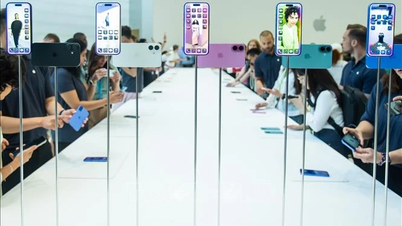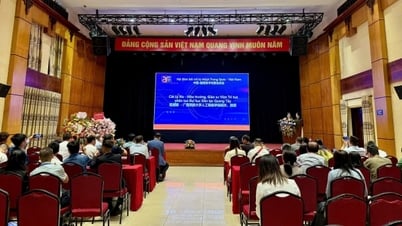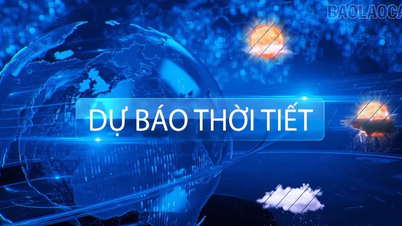Around the world , many primary and secondary schools now use electronic devices such as computers, phones, and tablets for teaching. However, this can have a negative impact on students' reading comprehension, according to a meta-analysis published on December 12.
Accordingly, researchers from the University of Valencia (Spain) analyzed more than 20 studies on reading comprehension published between 2000 and 2022. These studies involved nearly 470,000 people.
The results showed that primary and secondary school students who read paper documents for a long time can improve their reading comprehension ability 6-8 times compared to electronic documents. For high school and undergraduate students, although learning via electronic devices has a positive impact, it is still much less effective than paper documents.

New research shows that learning from paper books is 6-8 times more effective than learning through electronic devices such as phones and computers. Illustration: The Guardian
“The correlation between the frequency of digital reading for pleasure and text comprehension is close to zero,” said Professor Ladislao Salmerón, co-author of the study.
This is likely because “the linguistic quality of digital text tends to be lower than the traditional linguistic quality of printed text,” he points out. For example, social media posts are often conversational, lacking complex grammatical structures and arguments.
If the quality of e-documents increases, does reading comprehension increase? Lidia Altamura, co-author of the study, says nothing has changed. "We expected that going online for informational purposes, such as reading Wikipedia or online newspapers, would have a positive association with reading comprehension. But the data did not support that," Altamura says.
Meanwhile, Mr. Salmerón added, “reading mindset” with digital text also tends to be shallower than with paper books, with scanning becoming more common.
This can mean that readers “are not fully immersed in the story or do not fully grasp the complex relationships in an informational text.” Additionally, electronic devices are more likely to distract students.
Young children who read digital books regularly may also learn less academic vocabulary “during the critical period when they transition from learning to read to reading to learn,” the authors said.
Emphasizing that the researchers are not against reading on digital devices, Ms. Lidia Altamura said: "Based on what we found, reading habits of digital books do not bring as many benefits as reading books on paper. That is why when promoting reading activities, schools and school leaders should emphasize reading books on paper rather than reading books on electronic devices, especially for young readers."
A 2016 study from Carnegie Mellon University (USA) also showed that students who read paper books answered abstract questions that required reasoning better than those who read e-books. Experts from Victoria University of Wellington (New Zealand) confirmed that reading online makes students distracted, tired eyes and forms the habit of scanning more instead of reading from beginning to end like with printed books.
Responding to Education Week , Maryanne Wolf, director of a research center at the School ofEducation and Information Studies, University of California at Los Angeles (USA), said that for young children, paper books are the top choice for teaching, followed by audio and third is tablets. "Paper materials offer more advantages to students than electronic screens," Ms. Wolf noted.
And Dr. Jenny Radesky, a developmental behavioral pediatrician, says that when kids enter cyberspace, they have access to a multitude of platforms and websites. This makes it hard for them to resist opening another tab. “Kids can tell when the classroom is getting noisy, and we want them to know the same thing in cyberspace,” Radesky notes.
Minh Hoa (reported by Lao Dong, Thanh Nien)
Source





![[Photo] Ready for the top competitions of Vietnamese table tennis](https://vphoto.vietnam.vn/thumb/1200x675/vietnam/resource/IMAGE/2025/5/18/9c547c497c5a4ade8f98c8e7d44f5a41)
![[Photo] General Secretary To Lam visits exhibition of achievements in private economic development](https://vphoto.vietnam.vn/thumb/1200x675/vietnam/resource/IMAGE/2025/5/18/1809dc545f214a86911fe2d2d0fde2e8)




























![[Photo] National conference to disseminate and implement Resolution No. 66-NQ/TW and Resolution No. 68-NQ/TW of the Politburo](https://vphoto.vietnam.vn/thumb/1200x675/vietnam/resource/IMAGE/2025/5/18/adf666b9303a4213998b395b05234b6a)

































































Comment (0)